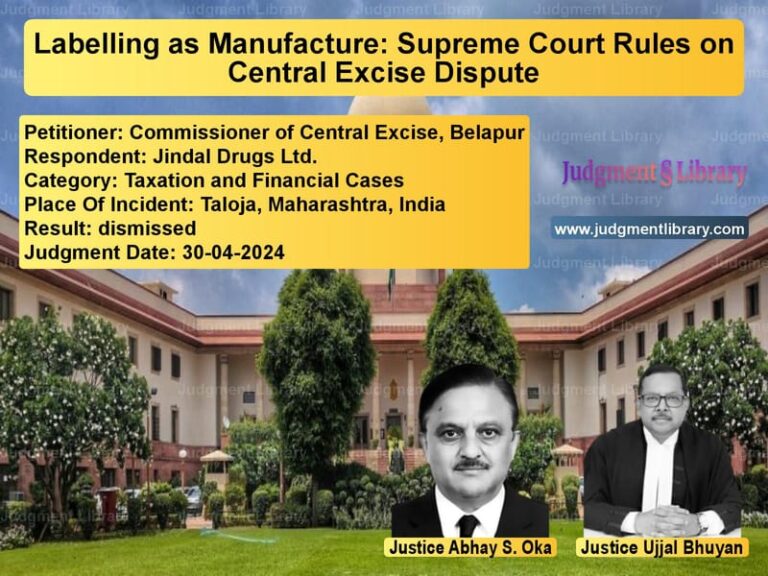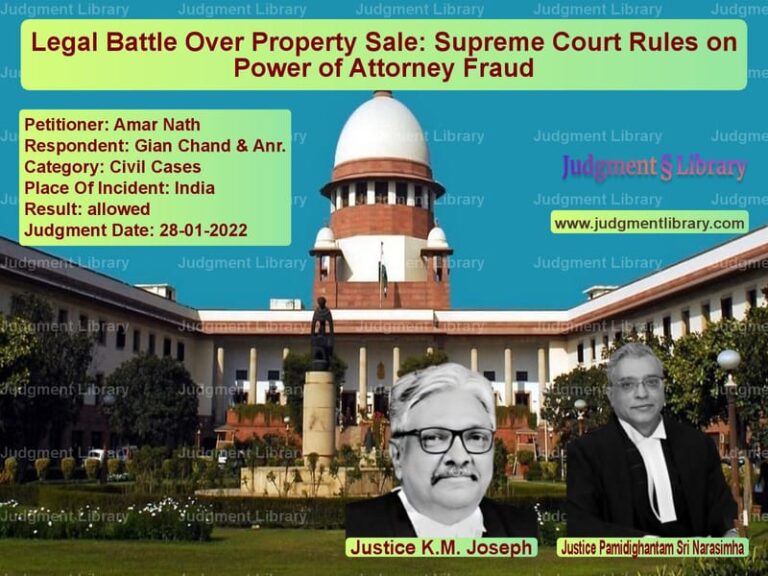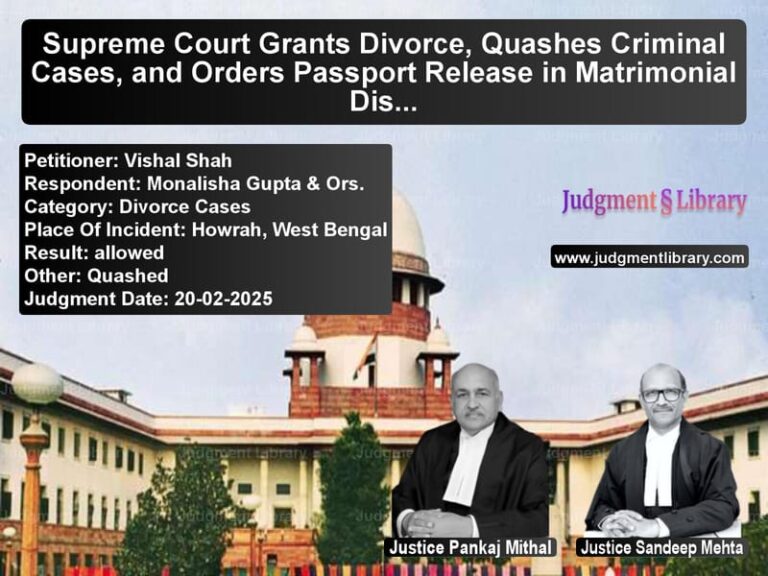Legal Battle Over Property Auction: Supreme Court Dismisses Appeal on Income Tax Sale Dispute
The case of Sunil Vasudeva & Ors. vs. Sundar Gupta & Ors. is a significant ruling concerning the validity of a property auction conducted by the Income Tax Department. The Supreme Court upheld the Calcutta High Court’s decision to recall its earlier judgment and directed that the matter be heard on its merits.
The dispute arose over a property at 43, Prithviraj Road, New Delhi, which was sold in an income tax auction in 1964 to V.N. Vasudeva, an income tax practitioner. The legal heirs of the original owner challenged the auction, claiming it was invalid due to a lack of court approval. After decades of litigation, the Supreme Court dismissed the appeal and directed the Calcutta High Court to decide the pending writ petition on merits.
Background of the Case
The legal dispute over the property began when the Income Tax Department auctioned it on August 18, 1964, to recover tax dues from Sambhuram Kirodimull HUF. The highest bidder, V.N. Vasudeva, purchased the property for Rs. 2,60,000. A sale certificate was issued in his favor on April 1, 1965.
The respondents, grandsons of Kirodimull Lohariwala, challenged the sale, arguing that it was conducted without the required permission from the Calcutta High Court, which was overseeing the family’s property dispute.
Petitioner’s Arguments
The appellants, legal heirs of V.N. Vasudeva, contended that:
- The auction was legally conducted by the Income Tax Department to recover tax dues.
- The sale was confirmed by the District Collection Officer, overruling objections from the previous owner.
- The High Court’s review of the case was not maintainable under Order 47 Rule 1 of the Civil Procedure Code (CPC).
- The respondents were engaging in repeated litigation to delay possession of the property.
Respondent’s Arguments
The respondents, grandsons of Kirodimull Lohariwala, argued:
- The sale was illegal as no permission was taken from the Calcutta High Court, which had jurisdiction over the property.
- The Income Tax Act, 1961, barred civil suits against the department, and a writ petition was the only remedy.
- V.N. Vasudeva was originally an income tax advisor to the Lohariwala family and misused his position to acquire the property at a low price.
- The High Court rightly recalled its order to ensure justice was served.
Supreme Court’s Observations
The Supreme Court, in its judgment delivered by Justices A.M. Khanwilkar and Ajay Rastogi, ruled in favor of the respondents and dismissed the appeal.
Validity of the Review Petition
“The High Court was correct in recalling its earlier order as the writ petition had not been properly adjudicated on merits.”
The Court ruled that the review petition was valid since the effect of Section 293 of the Income Tax Act was not previously considered.
Legal Effect of the Auction Sale
“The auction sale was conducted without obtaining prior approval from the High Court, which was a mandatory requirement.”
The Court held that the sale required approval from the High Court of Calcutta, which was overseeing the family’s financial matters.
Bar on Civil Suits Under Income Tax Act
“Section 293 of the Income Tax Act bars civil suits against the revenue authorities, making the writ petition the only available legal remedy.”
The Court confirmed that a civil suit against the Income Tax Department was not maintainable under the law.
Final Ruling and Impact
The Supreme Court ruled:
- The review petition filed by the respondents was valid.
- The earlier High Court order dismissing the writ petition was set aside.
- The case was sent back to the Calcutta High Court for fresh adjudication on its merits.
- The appeal by the petitioners was dismissed.
Legal Precedents Considered
The Supreme Court referred to several rulings, including:
- Kamlesh Verma vs. Mayawati (2013) 8 SCC 320: Defined the scope of review jurisdiction.
- V.N. Vasudeva vs. Kirodimal (AIR 1965 SC 440): Highlighted fiduciary obligations in property transactions.
- Section 293 of the Income Tax Act: Barred civil suits against the Income Tax Department.
Implications of the Judgment
This ruling has significant implications for property disputes involving government auctions:
- Auction sales require court approval if the property is under litigation.
- Writ petitions remain the only legal remedy against revenue authorities in such cases.
- Repeated litigation can be discouraged if courts apply review jurisdiction judiciously.
- Fiduciary obligations must be respected, preventing professional advisors from misusing their position.
Conclusion
The Supreme Court’s decision in Sunil Vasudeva & Ors. vs. Sundar Gupta & Ors. clarifies legal principles regarding income tax auctions, property disputes, and review jurisdiction. By dismissing the appeal, the Court upheld the need for procedural compliance in property transactions. This ruling sets a precedent for cases where government auctions are challenged on legal grounds.
Petitioner Name: Sunil Vasudeva & Ors..Respondent Name: Sundar Gupta & Ors..Judgment By: Justice A.M. Khanwilkar, Justice Ajay Rastogi.Place Of Incident: New Delhi, India.Judgment Date: 02-07-2019.
Don’t miss out on the full details! Download the complete judgment in PDF format below and gain valuable insights instantly!
Download Judgment: Sunil Vasudeva & Ors vs Sundar Gupta & Ors. Supreme Court of India Judgment Dated 02-07-2019.pdf
Direct Downlaod Judgment: Direct downlaod this Judgment
See all petitions in Property Disputes
See all petitions in Specific Performance
See all petitions in Judgment by A M Khanwilkar
See all petitions in Judgment by Ajay Rastogi
See all petitions in dismissed
See all petitions in supreme court of India judgments July 2019
See all petitions in 2019 judgments
See all posts in Civil Cases Category
See all allowed petitions in Civil Cases Category
See all Dismissed petitions in Civil Cases Category
See all partially allowed petitions in Civil Cases Category







